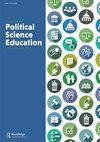超越学习管理系统:教授数字流畅性
IF 0.6
Q3 POLITICAL SCIENCE
引用次数: 2
摘要
为了适应不断变化的全球市场,雇主越来越多地寻找具有更复杂技术技能的员工。很大一部分政治学毕业生没有追求更高的学位,而是进入就业市场,在使用社交媒体、网站和数字政治营销的组织中从事一系列职业。虽然政治学讲师擅长培养口头和书面交流,但强调培养数字技能似乎不太常见。这个缺点可能对我们的毕业生不利。基于两所公立大学教授政治学的教师的反思,本文描述了在Z世代学习者中建立数字流利技能的教学方法,使用学习管理系统之外的平台来与强调新兴技术的学习成果保持一致。这种教学方法通过高阶学习促进内容保留,同时培养实用技能。通过创新的课程作业,学生学习新的平台,从而提高他们的数字流畅性。为了减少实施的潜在障碍,我们提供了对这些作业的反思以及建议,以促进学生的成功。本文章由计算机程序翻译,如有差异,请以英文原文为准。
Beyond Learning Management Systems: Teaching Digital Fluency
Abstract Employers increasingly seek employees with more sophisticated technical skills to meet the changing global marketplace. A significant portion of political science graduates do not pursue advanced degrees, instead entering the job market and holding an array of occupations in organizations using social media, websites, and digital political marketing. While political science instructors are adept at fostering oral and written communication, emphasis on cultivating digital skills appears somewhat less common. This shortcoming may be a disservice to our graduates. Based on reflections from instructors teaching political science at two public universities, this paper describes pedagogical approaches to building digital fluency skills among Generation Z learners using platforms beyond learning management systems to align with learning outcomes that emphasize new and emerging technologies. This pedagogical approach facilitates content retention through higher order learning while building practical skills. Through innovative course assignments students learn new platforms thereby improving their digital fluency. To mitigate potential obstacles to implementation, we offer reflections on these assignments along with advice to facilitate student success.
求助全文
通过发布文献求助,成功后即可免费获取论文全文。
去求助
来源期刊

Journal of Political Science Education
POLITICAL SCIENCE-
CiteScore
1.80
自引率
36.40%
发文量
69
期刊介绍:
The Journal of Political Science Education is an intellectually rigorous, path-breaking, agenda-setting journal that publishes the highest quality scholarship on teaching and pedagogical issues in political science. The journal aims to represent the full range of questions, issues and approaches regarding political science education, including teaching-related issues, methods and techniques, learning/teaching activities and devices, educational assessment in political science, graduate education, and curriculum development. In particular, the journal''s Editors welcome studies that reflect the scholarship of teaching and learning, or works that would be informative and/or of practical use to the readers of the Journal of Political Science Education , and address topics in an empirical way, making use of the techniques that political scientists use in their own substantive research.
 求助内容:
求助内容: 应助结果提醒方式:
应助结果提醒方式:


